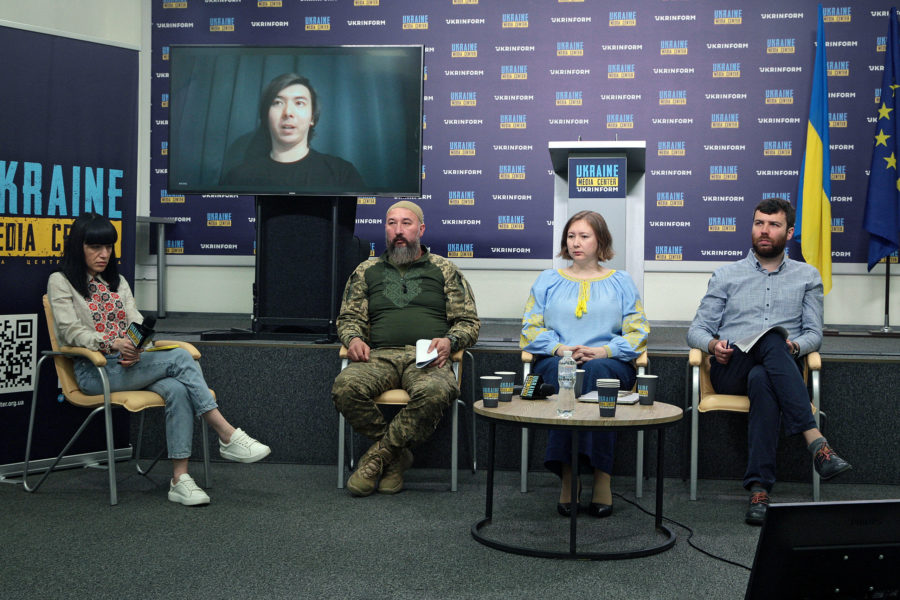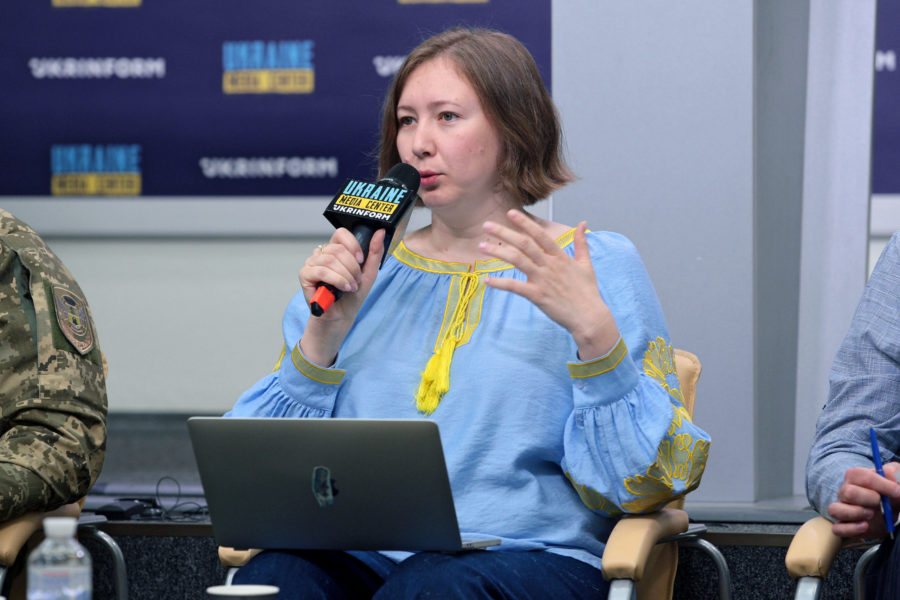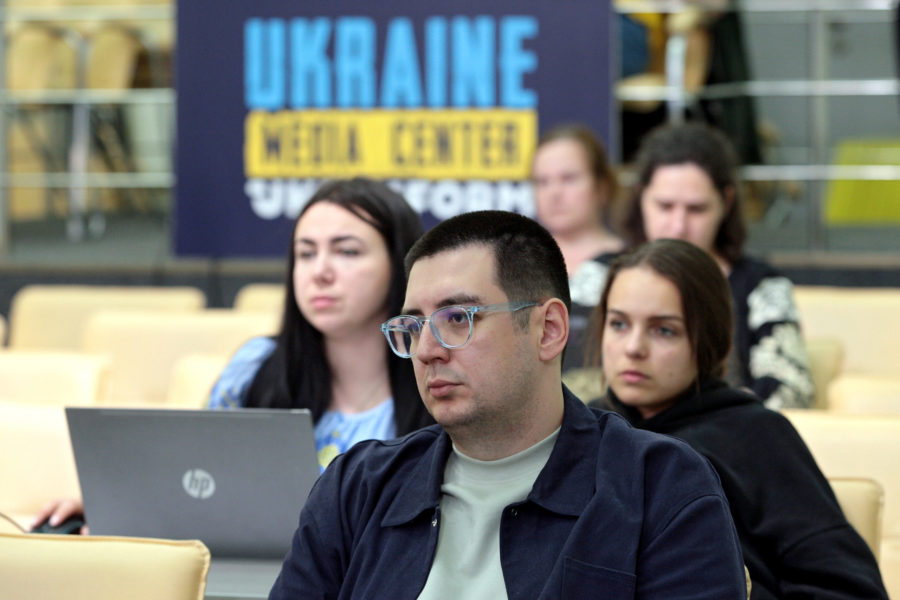Stalin’s deportation signature: 70% of decisions of occupation ‘courts’ passed against Crimean Tatars – human rights defenders
The actions of the Russian Federation in Crimea are a de facto continuation of Stalin’s policy of persecution and deportation of Crimean Tatars in 1944. Figures evidently confirm this: an analysis of 500 decisions of the so-called “courts” of the Russian Federation in the territory of Crimea shows that about 70% of the decisions concern the Crimean Tatars, although they constitute a minority relative to the entire population of Crimea.

The representatives of human rights organizations participating in Ukraine 5AM Coalition emphasized this during the press conference “War crimes against Crimean Tatars – a signature of those who carried out deportation in 1944”.
“Even the numbers show that this is a purposeful policy of discrimination. Decisions concerning the Crimean Tatars almost always resulted in real punishment – a fine or administrative arrest. Together with our colleagues, we submitted this evidence to the International Criminal Court and provided information confirming that this is a targeted practice. The evidence related to administrative and criminal prosecutions, the destruction of the cultural heritage of the Crimean Tatars is a crime against humanity within the general policy of Russification. This crime has been going on since 1944 – an attempt to destroy the Crimean Tatar people, albeit using different tools in some ways,” emphasized Olha Skrypnyk, Head of Board of the Crimean Human Rights Group.
“Since the peninsula was occupied, the Russians have been systematically persecuting the Crimean Tatars, breaking into their homes at dawn, just as it was in 1944. Prohibited literature is planted on them, after which many of them receive long terms – up to 19 years in prison. Also, since the autumn of 2014, the Crimean Tatars, accounting for about 13% of the entire population of Crimea, most often suffer from enforced disappearances,” said Yevheniy Yaroshenko, CrimeaSOS analyst.
According to him, while pro-Ukrainian activists were abducted the most at the beginning of the occupation of Crimea, then since the autumn of 2014 mainly Crimean Tatars have been abducted, in particular the representatives of the Mejlis of the Crimean Tatar People, their relatives, but there could also be random people who did not stand out for their social and political activity.
“Here it is worth mentioning Ervin Ibrahimov. On May 24 it will be seven years since he was kidnapped by persons wearing the uniform of the Russian patrol police, and since then it is not known whether he is alive or not, and if he is alive, in what condition and where he is held. Moreover, Isliam Dzhepparov, a son of well-known human rights defender Abdureshyt Dzhepparov, was kidnapped together with his cousin by people wearing uniforms similar to the FSB in September 2014. It is still unknown what is happening to these people. It is important to consider all these facts of abuse in close connection. Because all of them make up a picture of how the occupation administration behaves with the indigenous population of Crimea, pursuing its military, political or ideological goals,” Yaroshenko stressed.
According to him, the Russian Federation transfers its citizens from remote areas to the Crimean Peninsula and thereby creates the myth of an “originally Russian land”. In addition, among the methods of pressure, Yaroshenko mentions the stigmatization of the indigenous Crimean Tatar people, when the idea of them as violators of the law, saboteurs or terrorists is imposed.
 Olha Skrypnyk
Olha Skrypnyk “Every year on May 18, I feel pain for what our people went through. From the story of my grandparents, I knew what happened 79 years ago. I remember the story of my grandmother, who told how two girls, aged nine and six, lost their sick mother during the deportation. She died in the first months of deportation in the barracks of a special settlement. At night, these two little girls decided to bury their mother, carried her not far behind the barracks, dug a small hole, and covered her with earth. The hand of the deceased could be seen from this hastily thrown earth. Seeing this hand, the youngest daughter grabbed it and didn’t let go for a long time,” Ilimdar Khodzhametov, a Crimean Tatar born in the occupied territories, shared his memories.
In the past, he was an entrepreneur, a member of the Alushta Mejlis center. He had to leave the territory of the peninsula because of his activities. Currently, Khodzhametov is a serviceman of the Armed Forces of Ukraine and is personally doing everything possible to bring victory closer and liberate the peninsula.
Among other things, human rights defenders emphasize that many issues remain that require the development of mechanisms for their settlement: civilian hostages and deportees who are not subject to existing exchange procedures as in the case of combatants. There is also a question of compensation not only for material losses as a result of the war but also for damage caused by unlawful capture in detention facilities. In addition, there is a need to investigate crimes against humanity and war crimes committed by the Russian Federation since 2014.
“As the organization that is part of Ukraine 5AM Coalition which documents Russia’s crimes throughout the territory of Ukraine, we emphasize that it is very important that the International Criminal Court examine the crimes committed since 2014 and not be limited to crimes committed after February 24, 2022. And Crimea should also be a part of these investigations. The political and legal assessment of Russia’s actions has already been given: war crimes, crimes against humanity, and a purposeful policy against the Crimean Tatar people are being carried out,” Skrypnyk summarized.

Watch the full live stream of the event on the account of Ukraine 5AM Coalition.
If you have found a spelling error, please, notify us by selecting that text and pressing Ctrl+Enter.















